Robocop (1987)
Directed by: Paul Verhoeven
Written by: Edward Neumeier, Michael Miner
Starring: Kurtwood Smith, Nancy Allen, Peter Weller, Ronny Cox
USA
AVAILABLE ON BLU-RAY STEELBOOK AND LIMITED EDITION BLU-RAY from ARROW VIDEO
RUNNING TIME: 103 mins [director’s cut]/102 mins [theatrical cut]
REVIEWED BY: Dr Lenera, Official HCF Critic
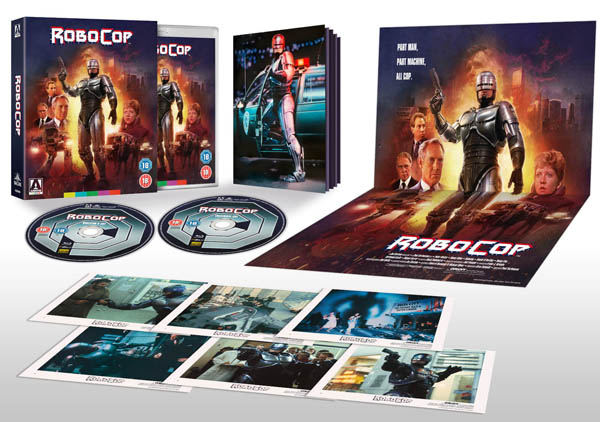
In the future, Detroit is on the verge of collapse due to financial mismanagement and a high crime rate. The city signs a deal with the mega-corporation Omni Consumer Products (OCP) to run the police department in exchange for letting OCP rebuild run-down sections of the city. Senior Vice President Dick Jones demonstrates a new law enforcement robot, ED-209, but it malfunctions, killing an executive. Ambitious executive Bob Morton uses the opportunity to introduce his own experimental cyborg design, RoboCop. When police officer Alex Murphy is shot by a group of armed robbers and dies in the trauma unit, OCP claims his body and converts it into RoboCop, who is programmed with three Prime Directives: serve the public trust; protect the innocent; and uphold the law….
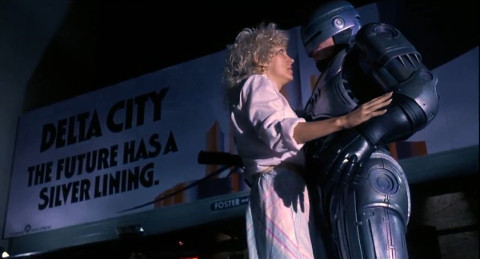
It’s interesting that, when Paul Verhoeven moved to Hollywood and tried to bring some of the qualities, not to mention the extreme nature, of much of his Dutch work to the Hollywood blockbuster, three out of the seven films that he made there heavily criticised aspects of the country. While there were a variety of things that he and his screenwriters attacked and mocked, Showgirls principally targeted [whether it did it well is beside the point] the fakeness and sexism of Hollywood and American popular culture. Starship Troopers‘s criticism of military jingoism was aimed principally at right-wing, “bomb them back to the stone age” American totalitarianism. And RoboCop, while it deals with a great many issues, is first and foremost an attack on and a warning against big corporations who want to run everything while not actually giving a damn about anyone except their bosses and shareholders. It’s only one of several ways in which RoboCop is even more relevant now then it was in 1987, Verhoeven and his two screen writers Ed Neumeier and Michael Minerclearly having a pretty good idea of where things were going. Showgirls became heavily mocked and was a huge flop, though it garnered a major cult following and has even had some reappraisal. Starship Troopers got a very divisive reaction and disappointing box office, and still hasn’t had its due in my view. But RoboCop instantly became very popular and got far better reviews than an ultra-violent sci-fi actioner normally got back in 1987. It’s not quite my favourite Verhoeven, but it might be his best balanced, controlled picture. It certainly gives you your kicks if you’re just after blood, guns and laughs [which sometimes occur all at the same time], and created a truly iconic movie character who is extremely powerful yet also extremely vulnerable, but it also had a hell of a lot of thought into it, another of its major themes being one that features in much of the very best science fiction – humanity.
Neumeier, inspired by Blade Runner and Judge Dredd, wrote the first treatment in 1981 about a robot cop becoming increasingly human, but it was rejected by many studios as it seemed incomplete. In 1984, he met Music video director Miner wrote a similar treatment about a dying police officer being turned into a cyborg; the two met in 1984 and decided to combine their ideas, but three studios again turned it down before Orion agreed to do it. After Alex Cox and Kenneth Johnson [who wanted to remove most of the violence] said no to directing, Verhoeven was sent the script and threw it away in disgust, but his wife, who was impressed, retrieved it from the bin and asked to him to read it more thoroughly. Rutger Hauer and Michael Ironside were favored to play RoboCop, but their build would have made it hard for them to move in the cumbersome suit, which took eight hours to be put on. The recently canceled Remington Steele’s Stephanie Zimbalist was due to play Nancy, but then they brought the show back so she became unavailable. Shooting mostly took place in Dallas and Pittsburgh’s Wheeling-Pittsburgh Steel’s Monessen Works, with very few sets being used. Peter Weller lost three pounds a day due to sweat loss while wearing the RoboCop suit in 100 °F (38 °C) temperatures. Production time ended with Murphy’s death unshot, which of course meant that Orion couldn’t refuse to put up more money for completion. The MPAA gave it an X rating 11 times, forcing Verhoeven to not only remove gory shots from ED-209’s shooting of Kinney in the boardroom, the Boddicker gang’s execution of Murphy, and Boddicker’s death, but to add the humorous commercials to lighten the mood. It’s hard these days to imagine a time when ‘R’ rated action films were so popular, but RoboCop was a huge hit and of course led to two sequels, a TV series and a remake.
Heavily biased news reports presented by smiley newsreaders followed by an tacky advertisement opens the film, and we return to these several times throughout, as well as a stupid sitcom. While finding some of these amusing, I used to also find them an irritating interruption in the action, but over the years I’ve grown to love them, partly because, of course, reality overtook them. And the opening report of the president and some members of his staff suffering weightlessness during a malfunction aboard a space satellite introduces another major theme, that of technology frequently going wrong. A lengthy tracking shot adroitly shows Murphy’s introduction to the Detroit police station, with some typical Verhoeven matter-of-fact nudity as we pass locker rooms of both sexes, something done more elaborately in Starship Troopers. But if you’ve never seen RoboCop [and why not, though it’s possible that you may have been put off by the mediocre 2014 remake], or haven’t seen it in a long time, please don’t think it’s mostly about important issues and nice camerawork, because it also works as a cracking action movie – though you need to remember that it’s a Verhoeven action movie, meaning that you see every bullet hit in bloody detail and have some very gruesome moments – though you may also find yourself chuckling at some of these very moments. Corporate bigwigs have this mechanical marvel ED-209 shown to them, and it goes out of control and blasts a guy to bits. It’s interesting to compare the theatrical and uncut versions of this scene. It’s both shocking and amusing in the theatrical cut, but is actually funnier in the uncut version because the gore is just so excessive. On the other hand, what follows is just shocking, even in cut form. Murphy, who’s just transferred to Detroit Police Station, is sent out with his new partner Anne Lewis to investigate a robbery. After a van/road chase they all end up at an abandoned steel mill where the nasty Clarence Boddicker and his cronies shoot Murphy repeatedly. It’s terrifying, agonising, and probably realistic.
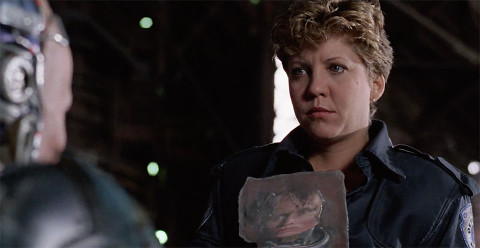
After this is perhaps the most striking of Verhoeven’s directorial devices, as for a few minutes we adopt Murphy’s viewpoint as he’s wheeled into the hospital, then maintain it as RoboCop is “brought to life”. It’s fascinating and horrifying, especially when Morton insists that they take away and replace the surviving human arm. “What they gonna do, replace us?”, worries one policeman when this new mechanical supercop first strides into the station, the writers seemingly being able to see into a future where replacement of humans by machines was horribly common. RoboCop begins an efficient campaign against crime, and for a while things become rousing, especially with Basil Poledouris’s instantly catchy main theme, though elsewhere the composer shows restraint, following the John Barry tradition of not trying to mimic the action and instead emphasis the emotion. However, even though Murphy’s memory was wiped, RoboCop begins to remember bits from Murphy’s life, including his death. The scene where he goes to the house he shared with his wife and son, with past mingling with present, might be the most moving of Verhoeven’s entire career, and enhanced so much by the changing tones of the score, musically showing us Robocop’s feelings. He now also begins to think of revenge – but there’s a snag and he doesn’t realise what he’s up against. Meanwhile OCP Chairman ‘The Old Man’ seems to like pitting his underlings against each other. When understandably put off by Jones’s plan to put ED-209’s all over the city and sell them, The Old Man lets Morton try his RoboCop thing. However, this makes Morton an enemy of the now-promoted Jones. Far from detracting from the main story, this thread is just as important as these two scumbags take aim at each other, neither caring what damage their basically very similar projects will cause for the city and the people in it. Sleazy, arrogant Miguel Ferrer and steely, sinister Ronny Cox are fabulous in these parts, and I’ve always wanted to watch a film just involving their characters.
Also terrific is Nancy Allen in a refreshingly non-sexual role [we’ve seen her in quite a few of those] as Lewis, who tries to get RoboCop to regain more of his humanity. The character’s best moment is possibly when RoboCop removes his helmet. Rather than screaming or looking in horror in a Phantom Of The Opera moment [though of course the classic monster RoboCop most resembles is Frankenstein’s Monster], she looks with compassion and friendship at the face stretched onto machinery, while Rob Bottin, who elsewhere gives us such sights as a man being covered in toxic waste then being decapitated by a speeding car, shows himself able of great subtlety here. There’s no romance, something that’s referenced in one of the most subtle of the film’s little but important touches, and a great example of how much thought has been put in. RoboCop shoots at some tins of baby food which are given just one, barely noticeable, closeup. The idea is clear – sex can never happen between these two. I wish more of today’s films would adopt this Show [Subtly] But Don’t Tell method. Of course RoboCop looks magnificent with his helmet on, but inside he’s a truly tormented figure, somebody trying to overcome a terrible death and reassert himself as a human being. On one hand Weller doesn’t really need to act in the title role, and in his early scenes as Murphy, he’s a little bland, though I wouldn’t be surprised if Verhoeven, who confused so many [even I’m still a bit confused, and I like that movie] with the peculiar way he got Elizabeth Berkeley to perform in Showgirls, asked him to play the role that way. When he’s RoboCop, you’re constantly drawn to his mouth as it’s visible, and are able to notice very slight changes with it, while his voice alters slightly in the latter part of the film.
While OCP clearly has access to technology that nobody else seems to have, this future isn’t that different from ours. People still act the same, talk the same. The film does seem to set up expectations of an epic Robocop Vs. ED-209 battle which doesn’t really take place [though the rather underrated sequel sort of made up for this], and the final confrontation doesn’t really reach the higher level of excitement that one might expect. Despite the satire and the jokes, the odd really goofy laugh perhaps jars, but look closely – even these tend to have a point. The biggest one is when ED-209 tries to chase RoboCop down some steps and falls over. After it does so, it behaves exactly like a very small child throwing a tantrum. The Ray Harryhausen fan in me [from about five years old] initially saw this moment as an exaggerated variant on the way his similarly stop motion creations were usually given one or two human-like touches that made you pity them, especially when they die, but really it’s suggesting that even a machine like ED-209 may have more feelings and vulnerability than the OCP heads and Boddicker and his gang. After all, the real monsters are often those who make or use them, not the monsters themselves. Beneath Robocop’s scathing [and scarily true now] satire and crimson-soaked mayhem is a very strong beating heart. Verhoeven was never a sentimentalist, but Robocop’s final word is a touching an acknowledgement of humanity as I’ve ever seen in the movies – without beating you over the head with it. Indeed that’s perhaps the real reason this film is so good – it’s achieves a hell of a lot of things, on different levels, while never forgetting to be an entertainment. It has a great deal to say, but nothing is rammed down your throat, it’s just there if you want it.
I own the 2014 Blu-ray from MGM in 2014, and that looked pretty good, but Arrow’s beats it for clarity and sharpness. It’s also rather brighter, which I found pleasing though may surprise some. I have no idea if it looked this bright in cinemas. There is a fair bit of grain, but it’s evenly distributed except for a few optical shots which is to be expected. The director’s cut inserts look slightly less impressive, but oddly enough though, that wire supporting a rocket in one shot is less noticeable here than it was on the MGM. Overall nothing to complain about.
Arrow have really pulled the boat out in terms of special features, more than half of which they’ve produced themselves. I’ll say the only slight negative first – the 2007 MGM DVD’s Flesh And Steel: The Making Of RoboCop documentary and Paul Sammon’s 1987 Featurettes Shooting RoboCop and Making RoboCop are not present, despite Sammon doing an audio commentary on this release. So completists may want to hang on to the DVD, though frankly there’s so much else here to get your teeth into it matters little. Seeing as this review is a little late, I wasn’t initially going to watch all the extras, but I enjoyed seeing the film again so much that I couldn’t help myself.
First up is the 2014 talk track from the MGM, with Verhoeven, Neumeier and executive producer Jon Davison, and it’s a fairly lively conversation packed with information and observations. The always enthusiastic Verhoeven is always great to hear and can talk for ages, but Neumeier, who even admits some writing he’s not too pleased with, and Davison get almost as much in. You learn about everything from a cut opening massacre scene to Verhoeven being ill throughout production because he was nervous about making his first special effects-filled movie to where some cast members improvised. Also mentioned are deliberate parallels to the story of Jesus, which I’ll be honest and never picked up on myself, but which is a prominent argument of Sammon’s laid back but never dull commentary. He’s often very scene specific as he dissects and provides production into about many scenes, and goes heavily into themes without ever getting too heavy. He repeats very little from the previous track and this is a valuable addition – as is the third commentary from Christopher Griffiths, Gary Smart and Eastwood Allen who may just be fans, but who have managed to unearth a huge amount of information about the film, only a small amount of it repeated. We’re told exactly where the opening space footage came from, who all the actors who tested for the part of RoboCop were [some are baffling], where you can see crew members, what scenes were improvised, what scenes were removed or altered – it’s a treasure trove for fans, but also full of appreciation without getting sickly. After an iffy start, the three banter really well. I loved all three of the commentaries about equally, and that’s something I never say.
On to the interviews, and The Future of Law Enforcement: Creating RoboCop has Miner go into the creation of the screenplay and who created what. Again, some formerly unrevealed information is told to us. The extras keep on giving with RoboTalk, the round table discussion with Neumeier being asked intelligent questions by director Nick McCarthy and screenwriter David Birke who scripted Elle for Verhoeven. Some of the main themes are discussed and we learn what Verhoeven specifically contributed – the visible pee on the suit not being from him really surprised me. In Truth of Character, Nancy Allen, who apart from the white hair seems to have barely changed, clearly loved the part and working on the film going by her interview, and initially “thought that was too smart to have mass appeal”. I can’t see it having such mass appeal if it were made today, but I’ll resist the temptation to go off on that one. Casting director Julie Selzer in Casting Old Detroit goes through why certain performers were chosen and why they took the parts. Connecting the Shots has second unit director Mark Goldblatt speak of what he shot and how he would work at night after Verhoeven had finished and was moving on to another location. Analog has visual effects guys Peter Kuran and Kevin Kutchaver discuss their beginnings before moving on to what they contributed to RoboCop, namely the shots from his point of view. Being very much into my film music, I was especially looking forward to More Man Than Machine: Composing Robocop where the score is looked at, and it didn’t disappoint. I never really noticed that Poledouris was especially drawn to archetypal masculinity subjects. RoboProps has Julien Dumont, who really is a fan [I personally don’t understand how someone can become that in love with a film, but that’s just me], show off his huge prop and memorabilia collection, and tell with glee when he thought he had the suit from RoboCop 2 and was told that it was actually the one from RoboCop. And last but not least of the Arrow featurettes is a 2012 Q and A with Verhoeven, Davison, Neumeier, Miner, Weller, Allen and effects animator Phil Tippett. Beginning amusingly with Verhoeven saying how he initially thought the script was rubbish, it takes a while for Weller and Allen to become involved, but is very good even if by now you know the topics that are going to be brought up. I liked when Verhoeven tells of how, being European, he insisted that Murphy and Lewis have an affair at the beginning until he realised he would be wrong seeing how he was now in American, and you can literally feel how proud Weller is of the film when he praises it.
The three 2007 DVD featurettes still play really well, with many cast and crew members seeming to enjoy talking about the film. RoboCop: Creating a Legend focuses on the suit [somewhat amusingly, we hear that it took eight, ten and eleven hours to put on from three different people], Villains of Old Detroit looks at the many and varied bad guys, and Special Effects: Then & Now seems really alien now as it talks about things like matte paintings and stop motion, things that aren’t done much now. Paul Verhoeven Easter Egg has Verhoeven discuss his easy to miss cameo. The four very short deleted scenes, the first of which is actually an extended part of the boardroom presentation, aren’t much. The others are a nun being interviewed, another “I’ll Buy That For A Dollar’ bit but here with boobs, and Lewis interviewed in hospital. And finally we get two features from the 2001 Criterion DVD. The Boardroom: Storyboard has Tippettt talks us through the scene with his drawings, and Director’s Cut Production Footage shows us those gruesome moments being shot while you can hear Verhoeven being very animated and even acting out characters.
Disc Two offers up not only the theatrical version but the U.S. TV cut. The comparison featurettes were on the 2007 release but not the entire TV version. It probably seems hard to imagine for some younger viewers, but us oldies remember when BBC and ITV used to show films we’d often seen on video and, much to our annoyance, they would be shorn of all bad language and most sex and violence. Sometimes the channels would do their own edits which often weren’t as drastic, but quite often we’d be lumbered with these American TV cuts. I never saw the RoboCop one back in the day, but it’s a good example; bad language – even fairly mild stuff like “scumbag” which is turned into “crumbag” – is altered into utterances that don’t always make sense but with pretty good voice acting, while the violence is heavily trimmed down, but edited rather well. One gruesome highlight is even given an alternate take [the car misses the man this time]. If you want your young kids to watch this cracking film but are understandably concerned about its nature extreme, don’t worry – just show them this version.
RoboCop offers a singular mixture of action, gore, humour, social comment and heart that, somehow, jells magically. Arrow’s Blu-ray release is jam packed with good special features, meaning that, even if you’ve bought this film more than once before, you should probably buy it again. Very Highly Recommended,
SPECIAL FEATURES
DISC ONE
* The Film – Director’s Cut (103:18, HD)
*Audio Commentary with director Paul Verhoeven, executive producer Jon Davison and co-writer Ed Neumeier [originally recorded for the theatrical cut and re-edited in 2014 for the director’s cut]
*Audio Commentary with film historian Paul M. Sammon
*Audio Commentary with fans Christopher Griffiths, Gary Smart and Eastwood Allen
*The Future of Law Enforcement: Creating RoboCop” interview with co-writer Michael Miner (16:51)
*”RoboTalk” conversation between co-writer Ed Neumeier and filmmakers David Birke and filmmaker Nick McCarthy (32:08)
*”Truth of Character” interview with actress Nancy Allen (18:26)
*”Casting Old Detroit” interview with casting director Julie Selzer (8:20)
*”Connecting the Shots” interview with second unit director Mark Goldblatt (11:06)
*”Analog” special photographic effects featurette including new interviews with visual effects artists Peter Kuran and Kevin Kutchaver (13:10)
*”More Man Than Machine: Composing Robocop”, tribute to composer Basil Poledouris featuring film music experts Jeff Bond, Lukas Kendall, Daniel Schweiger, and Robert Townson (12:08)
*”RoboProps” tour of super-fan Julien Dumont’s collection of original props and memorabilia (12:50)
*2012 Q&A with director Verhoeven, producer Jon Davison, writer Ed Neumeier, co-writer Michael Miner, actress Nancy Allen, actor Peter Weller, and effects animator Phil Tippett (42:37)
*Archival 2007 featurettes:
– “RoboCop: Creating a Legend” (21:10)
– “Villains of Old Detroit” (17:00)
– “Special Effects: Then & Now” (18:21)
*”Paul Verhoeven Easter Egg” director Paul Verhoeven on his cameo in the film (0:39)
*Deleted Scenes (with “Play All” option; 2:50):
– “OCP News Conference” (1:17)
– “Nun in the Street Interview” (0:15)
– “Topless Plaza” (0:26)
– “Final Media Break” (0:51)
*”The Boardroom: Storyboard” 2001 featurette with audio commentary by effects artist Phil Tippett (6:02)
*”Director’s Cut Production Footage” raw dailies from the filming of the unrated gore scenes (11:34)
*Theatrical Trailer 1 (1:38)
*Theatrical Trailer 2 (1:23)
*TV Spots (with “Play All” option; 2:03):
– TV Spot 1 (0:31)
– TV Spot 2 (1:02)
– TV Spot 3 (0:31)
*Image Galleries:
– Production Stills
– Behind the Scenes
– Poster & Video Art
DISC TWO
* The Film – Theatrical Cut (102 mins, HD)
* The Film – Edited for Television Cut (95:16 mins, SD)
*Audio Commentary with director Paul Verhoeven, executive producer Jon Davison, and co-writer Ed Neumeier (on the theatrical version of the film)
*Isolated Score Tracks:
– Composer’s Original Mix (in DTS-HD Master Audio 2.0 Stereo)
– Final Theatrical Mix (in DTS-HD Master Audio 2.0 Stereo)
*”Robocop: Edited for Television” compilation of alternate scenes from two edited-for-television versions, including outtakes newly transferred in HD from recently-unearthed 35mm elements (18:35)
*Split screen Comparisons:
– Theatrical vs Director’s Cut (4:02)
– Theatrical Cut vs TV Cut (20:16)
Read Bat’s review of RoboCop here.




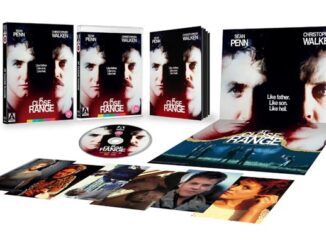
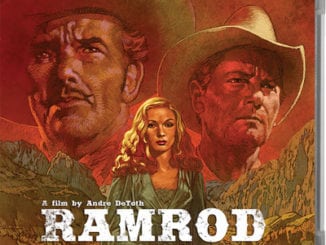
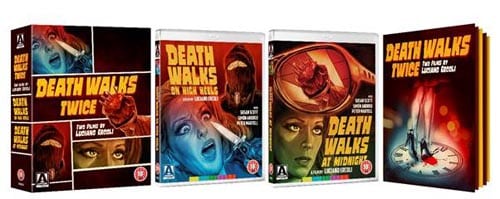
Be the first to comment